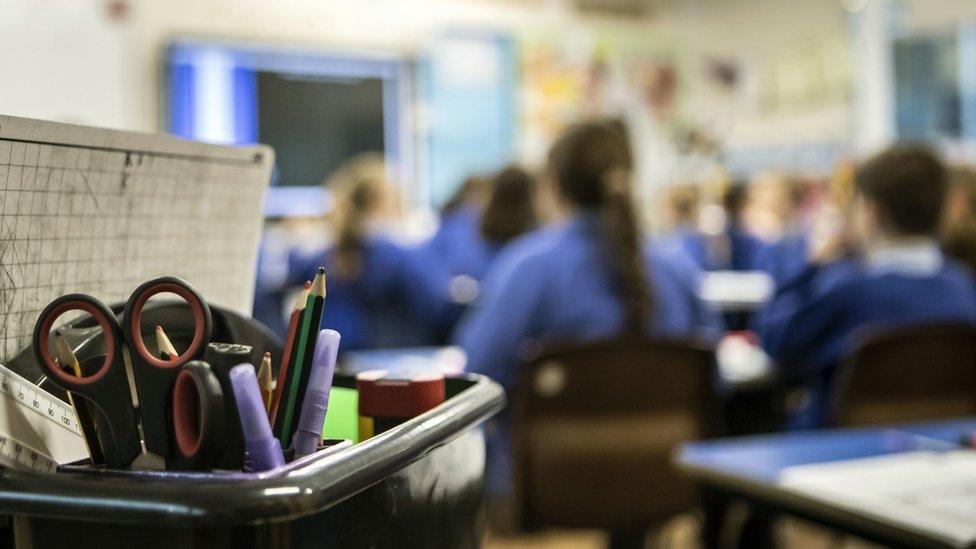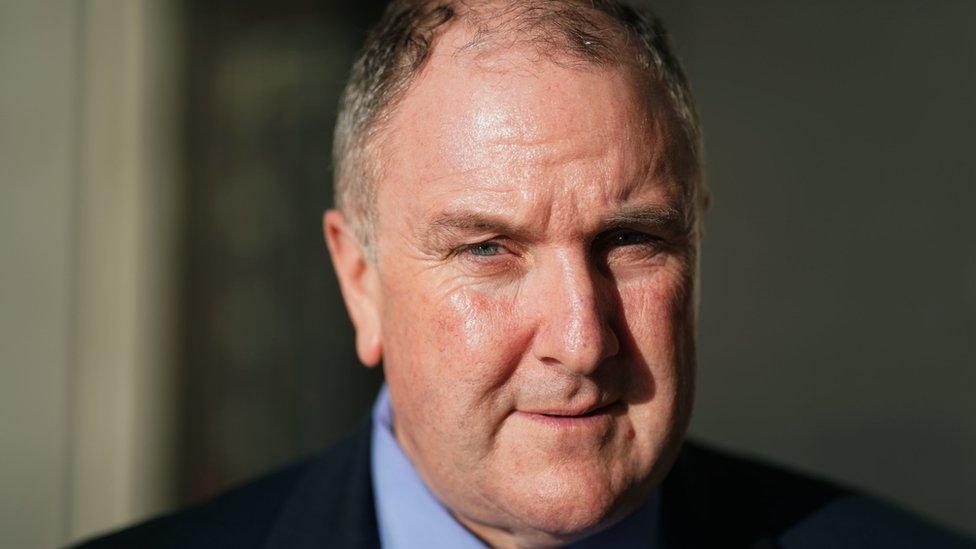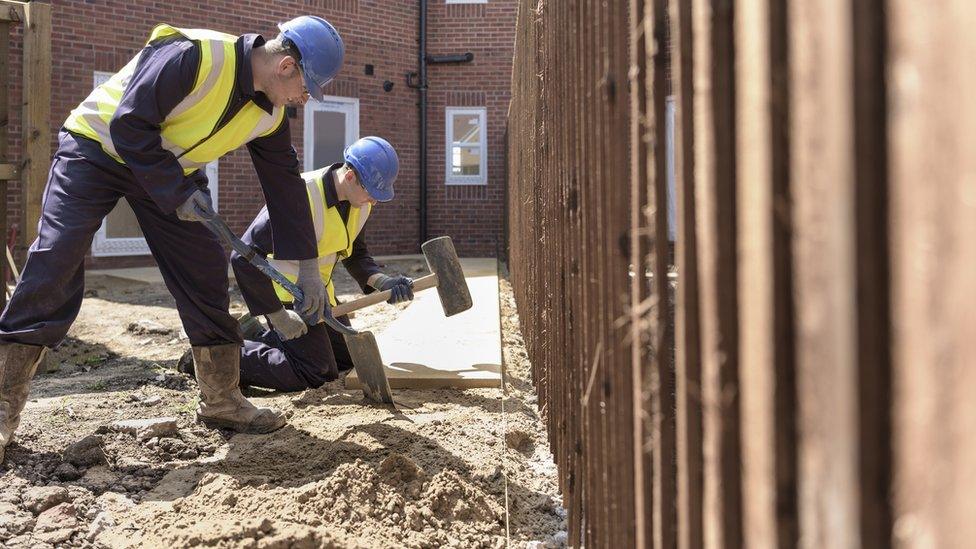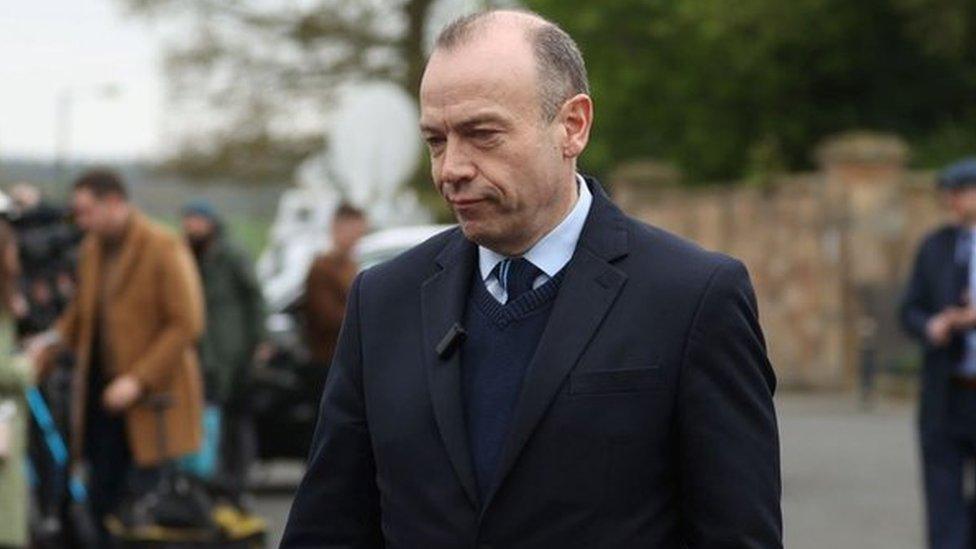Northern Ireland education cuts 'equivalent to losing 6,600 staff'
- Published

The Education Authority says it would have to cut 15% of its staff to meet savings targets
The Education Authority (EA) would have to make 6,600 staff redundant to deliver the savings it needs to make.
That is according to the chief executive of the authority Sara Long, speaking to a Westminster committee.
The EA is responsible for the day-to-day funding of schools and youth services and has to make around £200m of savings in 2023-24.
Ms Long told MPs on the Northern Ireland Affairs Committee that equated to making 6,600 staff redundant.
That would be 15% of EA's workforce but she said: "There's no voluntary exit scheme - we probably wouldn't be able to make that scale of reductions voluntarily anyway."
The £200m figure also does not take account of any future pay deals for teachers and non-teaching staff which would increase the costs the EA would face.
There has been stalemate over a pay deal for teachers in Northern Ireland for over two years, since 2021-22.
Cut to be higher
The annual funding for education was cut by £70m (2.5%) in the recent 2023-24 budget set by Northern Ireland Secretary Chris Heaton-Harris.
However the real-terms reduction, taking account of inflation, is likely to be higher.
The Northern Ireland Affairs Committee is conducting an inquiry into the funding and delivery of public services in Northern Ireland.
On Wednesday Ms Long gave evidence on education funding alongside the chief executive of the Controlled Schools' Support Council (CSSC) Mark Baker and the president of the National Association of Headteachers (NAHTNI) Liam McGuckin.
In response to a question from SDLP MP Claire Hanna, Ms Long said that 85% of the EA's budget went towards staff costs.
The authority employs about 44,000 staff, including teachers, classroom assistants and school transport, meals and other support staff.
"With 85% of our costs being staff, there aren't the levers to make the scale of reductions that are required to be made with that many staff," said Ms Long.
"We've done a quick analysis if you like which would suggest it would be about 6,600 whole time equivalents in order to make the scale of reductions that are needed."
"There's no voluntary exit scheme - we probably wouldn't be able to make that scale of reductions voluntarily anyway."
"So when you don't have the levers or the ability to do what you need to do around staff costs, it is initiatives and programmes that have to take the first slice if you like because your ability to deliver the scale and the extent of the reductions that are required is limited in other areas."
No money for school supplies
Mr McGuckin, who has been a primary school principal for almost 20 years, told MPs he relied on parents to pay for school supplies.
"The basic money in my budget should be enough to educate the children, to give them what they need," he said.
"I shouldn't need to be looking in September at what supermarket chain has the cheapest ream of paper so I can ask parents to buy a ream per child."
A number of schemes aimed at helping vulnerable and disadvantaged pupils have recently been axed by the Department of Education (DE) to save money.

Simon Hoare says "it's a bit rich" that unions have to take industrial action while politicians are "on strike"
Funding for others, like the Pathway fund which funds over 180 playgroups in low-income areas, is in doubt beyond the end of June.
DUP MP Carla Lockhart asked if early years staff employed through the Pathway Fund could be given any certainty about their employment after June.
"None of us can, Carla, because it is funded directly from the department," replied Ms Long.
The committee chair Simon Hoare criticised what he called an "abdication of responsibility" by politicians in making decisions in education.
"The civil servants' hands are tied, they can tread water to the status quo but they can't be bold, they can't be innovative," he said.
'Bit rich' of politicians
Mr Baker agreed.
"We need ministers and previous ministers sitting back in their offices, looking after their local constituencies, understanding Northern Ireland education," he said.
"It's a bit rich, isn't it, you know, if members of the unions are having ballots for industrial action when politicians are on strike," replied Mr Hoare.
During the session Ms Long also said that the EA would struggle to pay for essential health and safety maintenance to schools this year.
The department recently said no new school buildings or school extensions would be started in 2023-24 due to cuts to the education budget.
Ms Long also told MPs that some services for children with special educational needs (SEN) would "require budget reductions".
On Tuesday a large-scale report highlighted a range of problems to be tackled to provide adequate support to children with SEN.
Related topics
- Published9 May 2023

- Published23 May 2023

- Published25 April 2023

- Published16 May 2023

- Published27 April 2023

- Published30 March 2023
